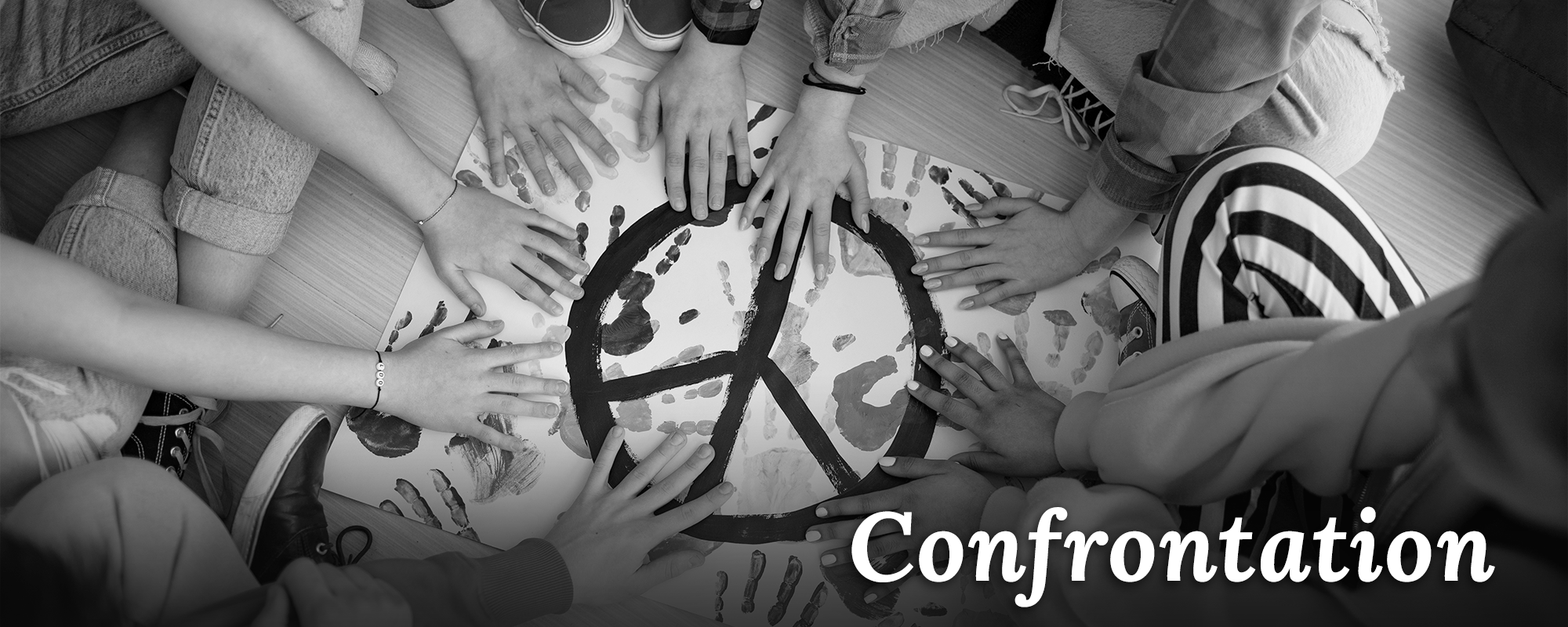Jesus wasn’t meek and mild. You don’t publicly execute meek and mild people. You crucify people who confront the system.
Life with Jesus then and now is 50 percent comfort and 50 percent confrontation. If Jesus’ words and example aren’t confronting you about how you live and what you treasure, then maybe you haven’t met the Jesus of the Bible.
Two-thousand years ago Jesus rode a donkey into the big city to let everyone know peace had come to town. Not a cheap peace or a false harmony like the ones we sometimes prefer. Not a “just let sleeping dogs lie” kind of peace, but a confronting peace that insists on justice and truth. A peace that won’t allow us to call darkness light or bitterness sweet. An incision-making peace necessary to drain infection.
This is the Jesus who confronts us for love’s sake.
For Faith, 2014
For People with Bishop Rob Wright
The podcast expands on Bishop’s For Faith devotional, drawing inspiration from the life of Jesus to answer 21st-century questions.
Read the Transcript:
Easton: This is For People, with Bishop Rob Wright.
Melissa: Welcome to For People with Bishop Rob Wright. I’m Melissa Rau, and this is Summer Shorts.
This summer, we’ve asked our listeners to share questions they have for Bishop. Here is question 4 of our 5-part series. Bishop, Laura from Georgia has a short but sweet question. How do we listen well?
Rob: Well, that is the $64,000 question, isn’t it? How do we listen well?
I think a couple things come immediately to mind. The Bible tells us have a listening God. Our God is listening God. And so, as we spend time with God, we begin to take on the characteristics of God. And so, being listened to by God as creating us and an appetite to be better listeners, right? We know that God is a listening God and a speaking God right? So, we want to be better listeners.
Number two, I think we have to do some, some quiet reflection about all the restlessness in ourselves. I mean, what’s blocking our ability to listen? What is constraining our ability to listen? A lot of times, you know, we are– You know, we’re sort of a storm inside of ourselves. And this diminishes our ability to listen. We’ve got things we need to prove, and our anxieties sometimes can take us over. And sometimes we’re afraid to listen, because we’re going to hear the thing that somewhere deep in us already knows the answer. And so, we’re sort of hedging. And so, there’s a restlessness inside of us. I think the other thing too, which constrains listening is that we want to win in conversations with one another. And that always does it as well.
And so, you know, for me, it’s always a deeply spiritual thing. So, as I find time to spend time with God, make time to spend time with God, what I find out is, is that some of that the peace of that time, rubs off on me. My shoulders can rest down a little bit, come down a little bit. I can realize, and I’m actually planted in the mind in the heart of God. And that increases in me the ability to sort of want to listen to myself, and to listen to others.
And so, what we’re really talking about is a spiritual competency, right? And it’s connected to anxiety and being non anxious. Which means, it’s connected to you and I really spending some time and checking in with ourselves. What’s going on with us? I would even say, you know, in terms of we can get therapeutic help here. You know, we can reach out to those clinicians, and therapists who can help us sort of interrogate the storm inside of us, which is sort of diminishing our ability to listen.
But I would say that if there’s any sort of doorway through which, you know, deep and abiding spirituality, you know, can enter it’s through the ears. It’s through the ears. Yeah.
And I think the other thing I would want to say, lastly, is that when we start to listen deep and well, silence for us, becomes really decorated. In other words, you know, I like to say that silence is God’s first language. And so, in better listening, silence is not the absence of anything. Actually, it’s a whole language. And you being to parse, you know, you begin to parse yourself, sort yourself, and begin to hear, you know, scripture and the music that touches our souls. And deep truths that we share with one another.
Melissa: Thanks for raising up the whole thing of listening to God and being able to parse through some of the things that God is telling us. It’s making clear because you said, our ears are most important and sometimes I think our eyes get in the way.
What happens though in relationship with one another, I like that when we are able to listen to God more fully, that perhaps it’s setting us up to listen to one another more? Do you feel like that there’s any prerequisite in order to listen to deeply. I know, my own daughter will sometimes say to me, “Mom, you’re not listening.” And my rebuttal to her is, “No, I am listening. I hear you. I just don’t agree.”
Rob: Right. This is a whole other Summer Short, right?
Melissa: Right. So, what do you need in order to listen well? Are there like prerequisites for it?
Rob: Yeah, well, I mean, Scripture talks about being quick to listen and slow to speak, right? Quick to listen. So, I think what we’re talking about is actually a spiritual discipline. It’s a focus and intentionality around increasing our ability to listen. And if we’re going to increase our ability to listen, we’ve got to figure out how to be, you know, less defensive, right?
And so, we’re talking about how to do time here. I know, I don’t know about you, but I know when I get in the heat of the moment, and you get sort of, you’re crossing swords with people, the listening goes out the window. And so, you know, one of the things I try to practice is to say, “Hey, you know, why don’t you just tell me everything that’s on your heart and just give me some time to sit with it.” And so, there’s no expectation that I’m going to have a quick answer for you, right? It is, I get to listen as fully as I can and then I get to walk away and chew on that, go live with it for a little while.
And so, I think, when we’re talking about prerequisites, we’re talking about figuring out how to build out some time. One of the things I talk about when I do marriage counseling, or have marriage premarital conversations, is I tell them, you need to learn how to fight fair. And part of that is, you know, you need to figure out when to argue, and only to argue when you have adequate time. Because when you compress, you know, legitimate concerns between spouses, you know, into a little bit of time, you all you do is sort of increase the intensity and the sort of temptation to not listen and to only argue, and so our best doesn’t come out. And so, if I’m learning anything, as I continue to journey, it is to do time better. And if I do time better than the listening increases. And you know, I can hear better, I can also hear my own anxieties.
And then, maybe the last thing we got to say is we got to be honest. So, there’s an invitation here to some more honesty, when we listen. You know, what are my actual anxieties here? You know, so it’s being in touch with who I am and what’s going on in the world. And what am I actually afraid of? You know, I wish we could have better political conversations in our country, locally, etc. And I wish that some of those conversations could begin with, hey, tell me what you’re afraid of? Before we got, you know, into sort of partisan bickering. What are you afraid of? What’s your deep concern? And maybe connecting with one another that way. But all that comes through listening?
Melissa: Well friends, listen up. And thanks for listening to Summer Shorts at For People. You can follow us on Instagram and Facebook at Bishop Rob Wright.
Please subscribe, leave a review, and we’ll be back with you next week.
Confrontation
Jesús no era ni débil y ni tímido. No se ejecutan públicamente a gente débil y tímida. Se crucifica a personas que confrontan al sistema. La vida con Jesús de entonces y de ahora es de 50 por ciento de consuelo y 50 por ciento de confrontación. Si las palabras y el ejemplo de Jesús no te confrontan sobre cómo vives y lo que atesoras, entonces tal vez no hayas conocido al Jesús de la Biblia. Hace dos mil años Jesús montó un burro en la gran ciudad para que todos supieran que la paz había llegado a la ciudad. No una paz barata o una falsa armonía como las que a veces preferimos. No es un tipo de paz «que se hace de la vista larga», sino una paz confrontante que insiste en la justicia y la verdad. Una paz que no nos permitirá llamar a la oscuridad luz o a la amargura dulce. Una paz de incisión necesaria para drenar la infección. Este es el Jesús que nos confronta por el poder de su amor.
Revista For Faith, 2014


